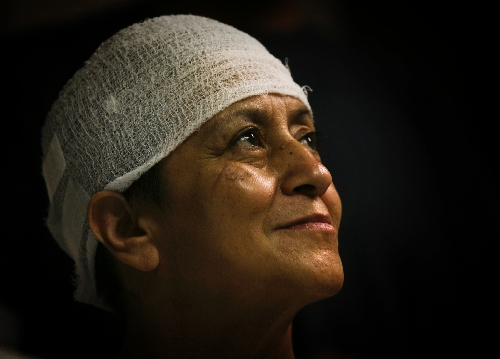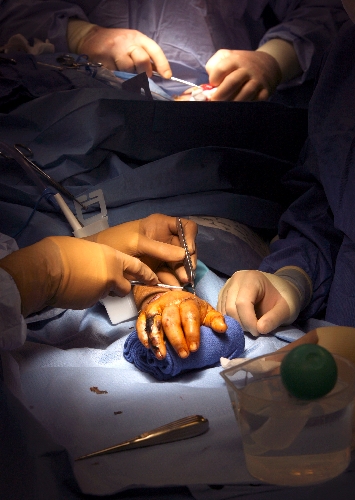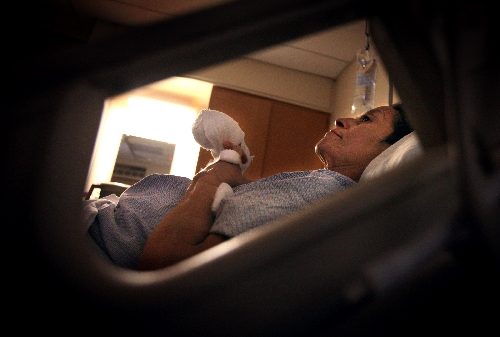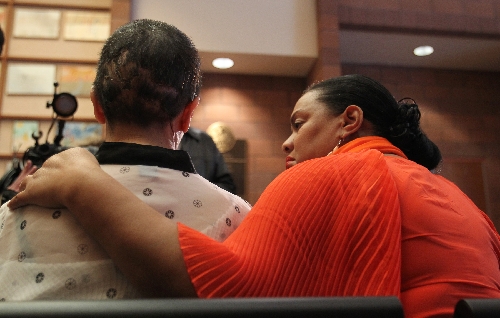Valley woman fights cancer after machete attack




Maria Del Carmen Gomez scrunches up her forehead to pull her eyes more widely open.
The remnants of morphine or Demerol swim in her system – she can’t remember which – and she fights off the drug-induced sleep that frees her from the pain of her recent cancer operation, from the memories of a savagery that saw her nearly beheaded, and nearly lose her hands, in a March ambush that authorities say was carried out by an ex-boyfriend wielding a machete.
It is Wednesday morning as Rebeca Ferreira visits with the groggy Gomez in her Valley Hospital room. A smiling Ferreira tells her friend: "You’re looking good. You’re going to be fine. You’re looking better."
Ferreira’s upbeat assessment, which draws a slight nod, a faint "thank you" and a weary wave from the cancer patient’s heavily bandaged right hand, belies the concern she expressed for Gomez in the hospital hallway.
"She’s been through so much, so much, too much," Ferreira said, hesitating before entering the dark hospital room. "Way too much. Maybe too much to live."
How much can one 53-year-old woman take?
It is a question that both Ferreira, whose Safe Faith United organization advocates for victims of domestic violence, and the surgeons who sewed Gomez back together after the machete attack – Dr. Carl Williams and Dr. Albert Capanna – have asked since Gomez underwent surgery nine days ago for metastatic uterine cancer.
Dr. Nick Spirtos, the gynecologist who headed the cancer surgical team, believes Gomez can make it.
"If anybody can make it, she can," said Spirtos, medical director of the Women’s Cancer Center of Nevada. "She was remarkably positive going into surgery. She showed me the scars on her head and her hands from the machete and said, ‘This cancer isn’t going to get me either.’ She has an incredible spirit."
Spiritos said he does not feel that stress from the machete attack contributed to her cancer.
"It was just too far along," he said.
During a nearly five-hour operation, his team removed Gomez’s uterus and ovaries while also cutting out cancer from her colon, diaphragm and lymph nodes.
Spirtos said he found malignant disease that was at an "advanced stage but curable. She’s going to need a bunch of chemotherapy. We should be able to get her on a good clinical trial for six months."
In her hospital room Wednesday, the recuperating Gomez was far more concerned about her brother’s health than hers, and she also worried about getting kicked out of her apartment and losing her car. She repeatedly bit her lip, and pulled on her hair with her good left hand.
"I hope Victor doesn’t have another stroke worrying about me," she told Ferreira. "He’s already had two."
Gomez had supported herself and her ailing brother with a job as a clerk at a Green Valley Grocery and by cleaning houses. Though she has health insurance, funds for rent, food and to pay her car note and insurance have largely come from Ferreira’s organization, which relies heavily on donations. The promise of Social Security disability has yet to be realized.
"I’ve got money for your car and insurance," Ferreira said, holding Gomez’s hand. "I don’t want you to worry about that. And somehow I’ll get your rent money. Don’t worry about Victor; he’s fine. Think about getting yourself better."
Until her recent cancer diagnosis, Williams and Capanna thought Gomez, who was attacked on March 21, would be fully recovered by Christmas, an amazing prognosis given that both her hands were nearly sheared from her wrists and her head, which had been full of skull fractures, had flopped forward after muscles in her neck had been severed.
"Everything was coming together so beautifully," said Williams, a plastic surgeon who has done three painstaking procedures since the attack to stabilize fractures and to reconnect tendons and ligaments and nerves that would enable Gomez to use her hands again.
The attack had left both hands hanging from her wrists by soft skin tissue.
"I got her left hand working well again, and I knew by the holidays that the right would be fine, too," Williams said. "She was so positive, so sure everything would be all right."
Williams noted that the use of a hyperbaric chamber helped the hands heal faster and that Gomez never complained of pain when he took out pins that had been used to hold fragile hand bones together.
Twice he and Capanna, a neurosurgeon who had to place several titanium plates in Gomez’s head to repair fractures, worked on the woman at the same time – on the night of the attack and in a follow-up procedure at Valley.
Capanna also had to reattach severed muscles in Gomez’s neck so her head could remain stable on her body.
"My God, this is terrible," Capanna said when he heard of the cancer diagnosis. "This is a woman who had to recover from her head practically hanging off her body and now this."
The two specialists were called to UMC last March in the middle of the night by trauma surgeon Dr. Jay Coates.
"All I knew at first was that a domestic violence case was coming in," Coates said.
One ambulance carried a man, the other a woman.
"It was a bloody mess," Coates recalled.
The man was Armando Vergara-Martinez, who police say slit his own throat after his machete attack on Gomez. Coates said his wounds were easily stanched.
Vergara-Martinez is in the Clark County Detention Center on a $250,000 bond, awaiting an October trial on charges that include attempted murder and domestic violence.
Coates still marvels at how Williams and Capanna did delicate surgery together on the woman for six hours: "Williams would work on one hand while Capanna worked on the front of the woman’s head, and then they flipped her on her stomach and worked on another hand and the back of her head."
Both physicians believe Gomez, who has no recollection of the beating that occurred in the parking lot of the store where she worked, was trying to cover her head with her hands as the attack took place.
"If he had come down another inch with his blows, he would have cut her head right off," Capanna said.
Earlier this summer, Gomez sat in her apartment with her brother and in two interviews talked about what happened. Gomez never cried and she said she was lucky to have such good doctors.
Both hands were then encased in thick bandages. She complained that she needed to bring a woman over just to go to the bathroom. She couldn’t brush her teeth or dress herself or talk on the phone.
Her hair was growing out – her head had been shaved to repair the skull fractures – but the scars from the machete blows to her head were still visible.
She still had no idea why her ex-boyfriend beat her.
"Maybe he was jealous I saw someone else," she said.
Gomez remembered that a couple of years before she had called police after her then-boyfriend attacked her. He spent 41 days in jail on a misdemeanor strangulation charge.
"I never went back to him, but I did speak to him on the phone," she said. "And then one day he said he needed help getting recommendations for a job. I told him to come by the store on the night the attack happened."
She longed for the day when she could testify against Vergara-Martinez in court. Once she showed up for a hearing in North Las Vegas only to learn that he intended to plead guilty to attempted murder with a deadly weapon, a charge that could keep him in prison for as long as 40 years.
He has since pleaded not guilty.
Gomez, who has been transferred from Valley Hospital to Vegas Valley Rehabilitation for further treatment, said in June that once her hands were healed and she was back at work, she looked forward to working with Ferreira, who had become a good friend.
Gomez joined Ferreira in an April fundraising walk for Safe Faith United and told her story to other women.
"I hope they listened to what I had to say," she said. "I told them to never let yourself be around someone who hurts you. Those kind of men never get better, only worse."
Contact reporter Paul Harasim at pharasim@reviewjournal.com or 702-387-2908.












